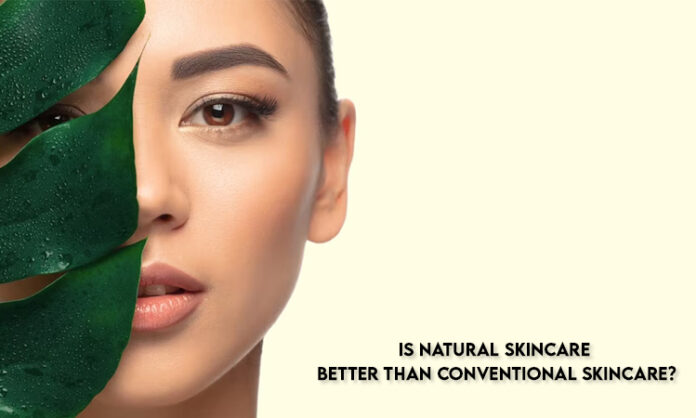With growing awareness about what we put in—and on—our bodies, more people are gravitating toward natural skincare. From DIY masks using kitchen ingredients to plant-based serums sold at organic stores, the shift is real. But the question still lingers: Is natural skincare actually better than conventional skincare?
Let’s unpack the truth behind both approaches to help you make an informed decision for your skin’s unique needs.
Understanding the Basics: Natural vs. Conventional Skincare
🌿 What Is Natural Skincare?
Natural skincare refers to products formulated with ingredients derived from nature—plants, flowers, roots, fruits, essential oils, and minerals. These are often free from synthetic chemicals, artificial fragrances, parabens, sulfates, and preservatives.
Common natural ingredients:
- Aloe vera
- Coconut oil
- Rose water
- Green tea extract
- Shea butter
- Essential oils like lavender, tea tree, and rosehip
Natural skincare emphasizes minimal processing, eco-conscious sourcing, and skin-friendly formulations.
🧪 What Is Conventional Skincare?
Conventional skincare includes mass-produced products that often contain laboratory-made ingredients, preservatives, artificial fragrances, and stabilizers. These products go through extensive testing and are often created for longer shelf life and broader efficacy.
Common synthetic ingredients:
- Retinol
- Hyaluronic acid (lab-derived)
- Salicylic acid
- Parabens
- Artificial fragrances and dyes
Many dermatologically-tested, pharmaceutical-grade products fall under conventional skincare.
Benefits of Natural Skincare
- Fewer Harsh Chemicals
Natural skincare avoids sulfates, parabens, and synthetic fragrances, which can irritate the skin or disrupt hormones. Especially for those with sensitive or acne-prone skin, fewer chemicals often mean fewer flare-ups.
- Eco-Friendly and Sustainable
Natural brands tend to be more environmentally conscious. From biodegradable packaging to ethically sourced ingredients, choosing natural helps reduce your ecological footprint.
- Gentle on Sensitive Skin
Ingredients like chamomile, calendula, and aloe vera are known for their soothing properties. Natural skincare is often less likely to cause redness, burning, or allergic reactions.
- Nutrient-Rich Botanicals
Natural ingredients come packed with antioxidants, vitamins, and essential fatty acids. For example, rosehip oil is high in Vitamin C, while argan oil delivers deep hydration through Vitamin E and omega fatty acids.
Downsides of Natural Skincare
While natural products sound ideal, they’re not without their drawbacks:
❌ Lack of Regulation
The term “natural” isn’t regulated globally, so products labeled as such might still contain synthetics. Always read the ingredient list!
❌ Shorter Shelf Life
Without preservatives, natural products may expire faster or become contaminated if not stored properly.
❌ Slower Results
Natural ingredients can be gentler but may take longer to show noticeable results compared to active compounds in conventional skincare.
Benefits of Conventional Skincare
- Scientifically Proven Results
Conventional skincare often includes clinically tested ingredients like retinol, salicylic acid, or niacinamide that are known to work effectively for acne, aging, or pigmentation.
- Longer Shelf Life
Thanks to preservatives, conventional products can last much longer, making them cost-effective and convenient.
- Targeted Formulas
These products are often engineered for specific skin concerns—be it cystic acne, rosacea, deep wrinkles, or melasma. They are tailored for effectiveness.
Downsides of Conventional Skincare
❌ Harsh Ingredients
Strong chemicals can disrupt the skin barrier, especially for sensitive skin types. Common culprits include alcohol, fragrances, and parabens.
❌ Potential Allergens
Artificial dyes and scents might smell great but often cause irritation or allergic reactions.
❌ Environment Impact
Conventional skincare may involve animal testing, non-biodegradable packaging, and unsustainable sourcing.
So… Is Natural Skincare Better?
The short answer is: It depends on your skin, values, and lifestyle.
Natural Skincare is Better If You:
- Prefer gentle, holistic care
- Have sensitive or allergy-prone skin
- Want eco-conscious, cruelty-free products
- Like minimalist ingredient lists
Conventional Skincare is Better If You:
- Need targeted treatment for skin concerns
- Prefer fast, visible results
- Have a dermatological condition needing medicated products
- Don’t mind synthetic additives when used safely
Can You Combine Both?
Absolutely! Many dermatologists now advocate for a hybrid skincare routine that combines the best of both worlds.
Example Routine:
- Cleanser: Natural aloe-based gel
- Toner: Rose water
- Serum: Conventional niacinamide serum
- Moisturizer: Natural shea butter cream
- Sunscreen: Conventional broad-spectrum SPF 50
This approach allows you to enjoy the benefits of effective actives while maintaining a skin-friendly, holistic routine.
